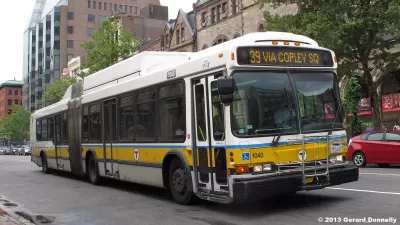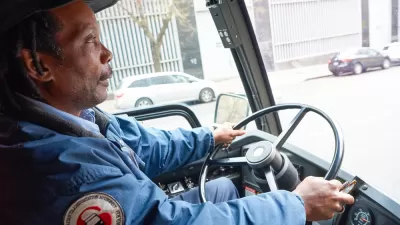Cities around the country are embracing free fares to lure riders back to public transit, but the ridership recovery continues to sputter.

Like other cities, Boston began offering free transit as a way to address historic inequities and boost faltering ridership during the pandemic. But despite the benefits of eliminating transit fares, that policy alone may not do as much to reduce carbon emissions or congestion as some advocates hope, write Lisa Kashinsky and Tanya Snyder in Politico.
Early analysis of Boston’s initial Route 28 bus initiative by both the city and the MBTA showed mixed results: Ridership was up and boarding was quicker during the first four months of the program. Yet only 5 percent of survey respondents said they would have taken a car if not for the free bus trip, undermining the claim that free transit is a climate initiative or a cure for urban congestion.
The authors point out two concerns about free transit programs: “First, while ridership on the free lines usually goes up, generally the boost comes from those who might typically bike or walk, rather than pulling people out of their cars”
“Second, riders — including those with low incomes — consistently say that what really matters to them is whether the bus comes frequently enough to be useful.” Sacrificing service for lower fares doesn’t ultimately serve the people most dependent on transit.
The other major question: long-term funding. Many recent free transit programs were funded by pandemic relief dollars. “When that dries up, it’s unclear where the money will come from to keep these programs rolling.”
FULL STORY: Mayors are wielding free transit to draw people back downtown. It’s not that easy.

Planetizen Federal Action Tracker
A weekly monitor of how Trump’s orders and actions are impacting planners and planning in America.

Maui's Vacation Rental Debate Turns Ugly
Verbal attacks, misinformation campaigns and fistfights plague a high-stakes debate to convert thousands of vacation rentals into long-term housing.

Cuomo Is the Candidate of Both NIMBYs and Developers. What Gives?
In the New York City mayoral race, odd bedfellows align to preserve the housing status quo.

San Antonio and Austin are Fusing Into one Massive Megaregion
The region spanning the two central Texas cities is growing fast, posing challenges for local infrastructure and water supplies.

Charlottesville Temporarily Has No Zoning Code
A judge ordered the Virginia city to throw out its newly revised zoning code, leaving permitting for new development in legal limbo.

In California Battle of Housing vs. Environment, Housing Just Won
A new state law significantly limits the power of CEQA, an environmental review law that served as a powerful tool for blocking new development.
Urban Design for Planners 1: Software Tools
This six-course series explores essential urban design concepts using open source software and equips planners with the tools they need to participate fully in the urban design process.
Planning for Universal Design
Learn the tools for implementing Universal Design in planning regulations.
Heyer Gruel & Associates PA
JM Goldson LLC
Custer County Colorado
City of Camden Redevelopment Agency
City of Astoria
Transportation Research & Education Center (TREC) at Portland State University
Jefferson Parish Government
Camden Redevelopment Agency
City of Claremont





























